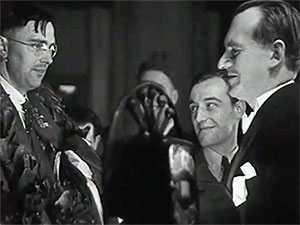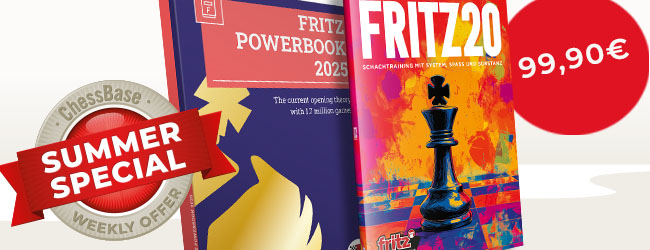In the last couple of years, several videos have surfaced concerning the famous 1935 World Championship match between Alexander Alekhine and Max Euwe. Although it is not hard to find images of many world championships, they usually concern either a few shots of the players at the board, or the champion ceebrating the title with the time immemorial wreath and victor's cup.
In this, the footage stands out, as it shows scenes of the opening ceremony, with speeches and players, not to mention the day the title was won, showing a dazed and shocked Alekhine, still trying to grasp what had happened. Here are select images and the videos they came from.
Few names among the world champions have been subject to as many varied
(and wrong) pronunciations as that of Max Euwe. Here is a 16-second video
showing the correct pronunciation.
After Alexander Alekhine had issued his challenge to Max Euwe in 1933, Capablanca and Euwe commented on the forthcoming match on camera with interviewer Hans Hollander.
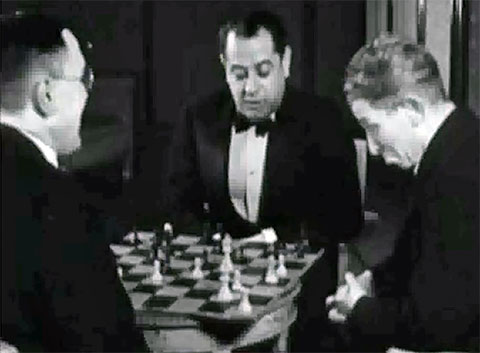
"Dr. Alekhine's game is 20% bluff. Dr. Euwe's game is clear and straightforward.
Dr. Euwe's game—not so strong as Alekhine's in some respects—is more evenly
balanced." Then Euwe gives his assessment in Dutch, explaining that his feelings
alternated from optimism to pessimism, but in the previous ten years, their score
had been evenly matched at 7–7.
This is the original footage in which you can hear Capablanca give his opinion in very clear English
When Euwe was challenged in 1933, he was regarded as one of three credible challengers (the others being José Raúl Capablanca and Salo Flohr). He accepted the challenge for October 1935. A year later he further confirmed his status as a proper challenger when at Zürich 1934, Euwe finished second, behind only World Champion Alexander Alekhine, whom he defeated in their game.
The match took place in the Netherlands, and was played in thirteen cities: Amsterdam, Delft, Rotterdam, Utrecht, Gouda, Gravenhage, Groningen, Baarn, Hertogenbosch, Eindhoven, Zeist, Ermelo, and Zandvoort. The match conditions were the best of 30 games, with at least six wins by the victor.
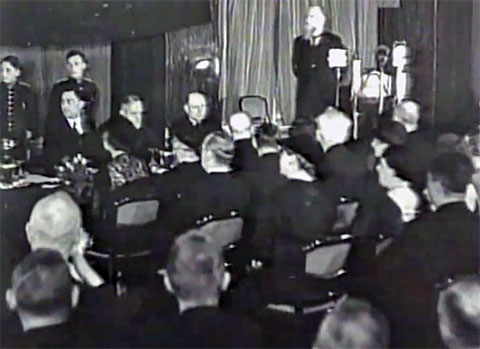
Minister of Education, Arts and Sciences J.R. Slotemaker de Bruin opens the
world championship opening ceremony.
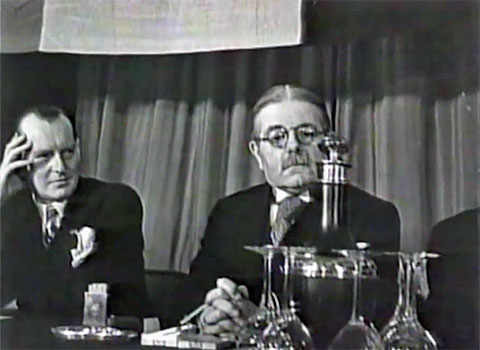
He first speaks to Alekhine...

and then
to Euwe (right leaning forward slightly).
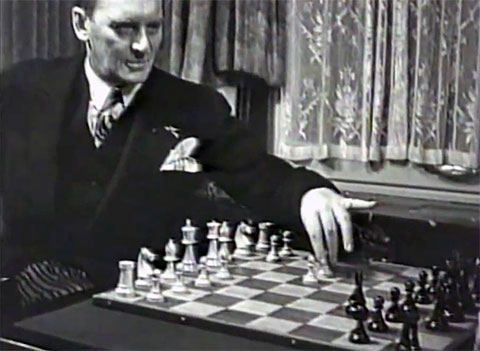
They play a few moves for the camera, and Alekhine, with his delicate gestures,
gives his opponent a hard stare

Max Euwe makes a bit of a show, and then plays the... Budapest Gambit
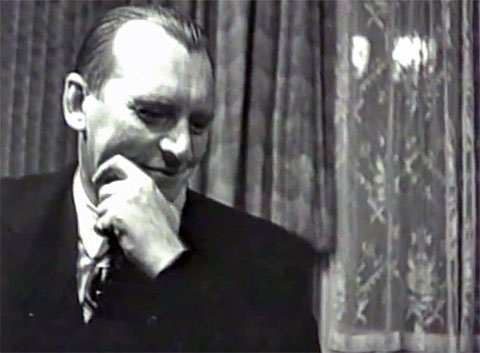
His choice and showmanship immediately bring a smile from Alekhine
On December 15, 1935 after 30 games played in thirteen different cities around The Netherlands over a period of 80 days, Euwe defeated Alekhine by 15.5–14.5, becoming the fifth World Chess Champion. Alekhine quickly went two games ahead, and even enjoyed a three-point lead at game nine, but from game 13 onwards Euwe won twice as many games as Alekhine. His title gave a huge boost to chess in The Netherlands. This was also the first world championship match in which the players had seconds to help them with analysis during adjournments.
Max Euwe's victory in game 26 is called the Pearl of Zandvoort:
| 1.e4 | 1,186,706 | 54% | 2421 | --- |
| 1.d4 | 960,560 | 55% | 2434 | --- |
| 1.Nf3 | 286,913 | 56% | 2440 | --- |
| 1.c4 | 185,115 | 56% | 2442 | --- |
| 1.g3 | 19,902 | 56% | 2427 | --- |
| 1.b3 | 14,609 | 54% | 2428 | --- |
| 1.f4 | 5,959 | 48% | 2376 | --- |
| 1.Nc3 | 3,919 | 50% | 2383 | --- |
| 1.b4 | 1,791 | 48% | 2379 | --- |
| 1.a3 | 1,252 | 54% | 2406 | --- |
| 1.e3 | 1,081 | 49% | 2409 | --- |
| 1.d3 | 969 | 50% | 2378 | --- |
| 1.g4 | 670 | 46% | 2361 | --- |
| 1.h4 | 466 | 54% | 2382 | --- |
| 1.c3 | 439 | 51% | 2425 | --- |
| 1.h3 | 289 | 56% | 2420 | --- |
| 1.a4 | 118 | 60% | 2461 | --- |
| 1.f3 | 100 | 47% | 2427 | --- |
| 1.Nh3 | 93 | 66% | 2506 | --- |
| 1.Na3 | 47 | 62% | 2476 | --- |
Please, wait...
1.d4 e6 2.c4 f5 3.g3 Bb4+ 4.Bd2 Be7 5.Bg2 Nf6 6.Nc3 0-0 7.Nf3 Ne4 7...d5 8.0-0 b6 8...Bf6 9.Qc2 Bb7 10.Ne5 Nxc3 10...d6? 11.Nxe4! fxe4 11...dxe5 12.Nf6+ 12.Bxe4 Bxe4 13.Qxe4 11.Bxc3 11.Bxb7 Nxe2+ 12.Kg2 Nxd4 13.Qd3 Nbc6 14.Nxc6 Nxc6 14...dxc6 15.Bxa8 Qxa8 16.Qxd4?? c5+-+ 15.Bxa8 Qxa8 16.Qxd7?? Ne5+-+ 11...Bxg2 12.Kxg2 Qc8 13.d5! d6 14.Nd3 e5 15.Kh1 15.f4 15...c6 16.Qb3! Kh8 16...c5 17.f4 e4 18.Ne1 17.f4 e4 18.Nb4! c5 19.Nc2 Nd7 20.Ne3 Bf6 21.Nxf5!± Bxc3 22.Nxd6 Qb8 23.Nxe4 Bf6 24.Nd2! g5! 25.e4 gxf4 26.gxf4 Bd4 27.e5 Qe8 28.e6 Rg8 28...Nf6? 29.Nf3 29.Nf3?! 29.exd7? Qe2! 29.Qh3! Nf6 30.Nf3 Bxb2 31.Rab1+- 29...Qg6 30.Rg1 30.Ng5 Ne5! 30...Bxg1 31.Rxg1 Qf6?+- 31...Qf5! 32.exd7 32.Ng5 h6! 32...Rxg5 33.fxg5 Qe4+ 34.Rg2 Qe1+ 35.Rg1= 32...Rxg1+ 33.Kxg1 Qxd7 34.Kf2= 32.Ng5! Rg7 32...h6 33.Nf7+ Kh7 34.Qd3+ Rg6 35.Ne5! Nxe5 35...Nf8 36.e7! 36.fxe5 Qg7 37.d6 Qb7+ 38.Qd5 Rxg1+ 38...Qxd5+ 39.cxd5 Rxg1+ 40.Kxg1 Kg6 41.d7 Rg8 42.Kh1 Kf5 43.e7+- 38...Qg7 39.Rxg6 Qxg6 40.Qb7++- 39.Kxg1 Qg7+ 40.Qg2 Rg8 41.Qxg7+ Rxg7+ 42.Kh1 Kg6 43.d7+- 32...Rxg5 33.fxg5 Qd4 34.Qc3+- 33.exd7 Rxd7 34.Qe3 Re7 34...Qxb2 35.Qe6+- 35.Ne6 Rf8 35...Qxb2 36.d6! Ree8 36...Rd7 37.Nc7 Rf8 38.Qe5++- 37.d7 Re7 38.d8Q+ Rxd8 39.Nxd8+- Rxe3?? 40.Nf7# 36.Qe5 Qxe5 37.fxe5 Rf5 37...Rxe6 38.dxe6 Rf5! 38...Re8 39.Kg2 Rxe6 40.Re1 Kg7 41.Kf3+- 39.Re1 Kg8 40.Re3! 40.Kg2 Kf8 41.Rf1? Rxf1 42.Kxf1 Ke7 40...Kf8 41.Ra3 Rxe5 41...a5 42.Rb3 42.Rxa7 Rxe6 43.b3! Re2 44.Rxh7 Rxa2 45.Rb7+- 38.Re1?! 38.Rg5! Rxg5 39.Nxg5 Kg7 39...h6 40.d6!+- 40.d6! Rxe5 40...Rd7 41.Ne6+ Kf7 42.Nf4 Ke8 43.Kg2 Rg7+ 44.Kf3 Kd7 45.Ke4 Kc6 46.Nd5+- 41.d7 Re1+ 42.Kg2 Rd1 43.d8Q Rxd8 44.Ne6++- 38...h6?! 38...Rxe6! 39.dxe6 Kg8 40.Re3! 38...Kg8 39.Rg1+ Kf7 39...Kh8 40.Rg5 40.Nd8+ Kf8 41.Nc6+- 39.Nd8 Rf2 40.e6 Rd2 41.Nc6 Re8 42.e7 b5 43.Nd8 Kg7 44.Nb7 Kf6 45.Re6+ Kg5 46.Nd6 Rxe7 47.Ne4+ 1–0
- Start an analysis engine:
- Try maximizing the board:
- Use the four cursor keys to replay the game. Make moves to analyse yourself.
- Press Ctrl-B to rotate the board.
- Drag the split bars between window panes.
- Download&Clip PGN/GIF/FEN/QR Codes. Share the game.
- Games viewed here will automatically be stored in your cloud clipboard (if you are logged in). Use the cloud clipboard also in ChessBase.
- Create an account to access the games cloud.
| Euwe,M | - | Alekhine,A | - | 1–0 | 1935 | A90 | World Championship 16th | 26 |
Please, wait...
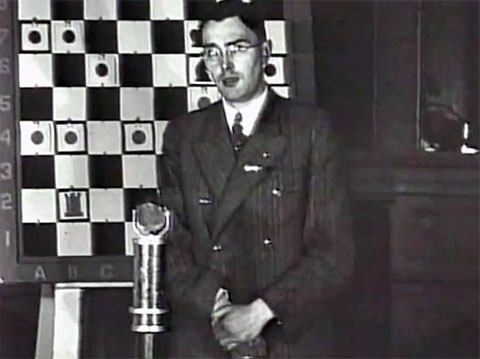
After the draw on game 30, Max Euwe was asked to say a few words
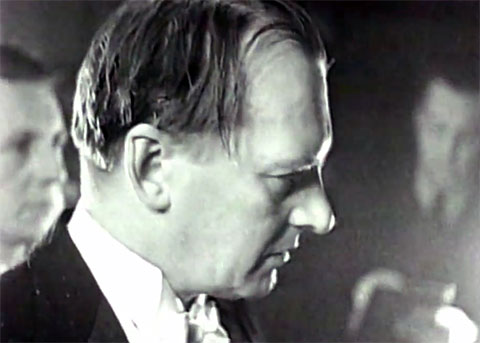
As Euwe spoke, the camera turned to show Alekhine who looks dazed and shocked
Euwe's win was regarded as a major upset – he reportedly had believed that beating Alekhine was unlikely – and is sometimes attributed to Alekhine's alcoholism. But Salo Flohr, who was helping Euwe during the match, thought over-confidence was more of a problem than alcohol for Alekhine in this match, and Alekhine himself said he would win easily. Former World Champions Vasily Smyslov, Boris Spassky, Anatoly Karpov, and Garry Kasparov analyzed the match for their own benefit and concluded that Euwe deserved to win and that the standard of play was worthy of a world championship.
Former World Champion Vladimir Kramnik has said that Euwe won the 1935 match on merit and that the result was not affected by Alekhine's drinking before or during the match.
Vladimir Kramnik in an interview:
The rumour was that he lost the title because of his drinking habit, then gave up the booze and won, which actually has nothing to do with reality. First of all, Euwe had a positive score (3-1 in decisive games) against Alekhine in the period between their match and return-match. This means that although Alekhine broke his drinking habit almost immediately after the match, Euwe kept on beating him. The return also saw an even contest. In the first match it was Alekhine who collapsed while in the return the same thing happened to Euwe who lost several games in a row. Why did it happen? Euwe might not have wanted to remain World Champion, the title might have been a heavy psychological burden for him. Anyway, I think that it did not happen by pure chance. The return was not a piece of cake for Alekhine; this myth should be dispelled.
It is worth adding that part of the myth behind the belief that drink was to blame, is the crushing score Alekhine inflicted on Euwe in the 1937 rematch, which he won by 15.5-9.5. What history sometimes forgets is that up until game 20 of that match, Alekhine only led by 11.0-9.0, which would never be described as crushing. For whatever the reason, Euwe collapsed after this, losing four of the final five games, hence Kramnik's logical assessment that the reason was probably not purely chess related, as Euwe had shown his ability up to the match, and during it, to face Alekhine at the board.
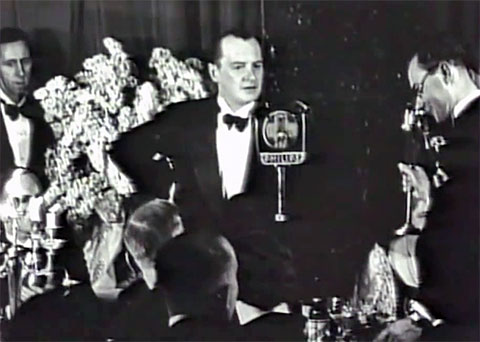
At a gala at the Carlton Hotel, Alexander Alekhine threw down the gauntlet
(in French): "I am proud and happy that the world of chess has a champion
who is a gentleman. I am proud and happy that this gentleman is honorable.
I take this opportunity to officially challenge my opponent. And I am happy,
without hypocrisy, that if I am not the champion, a Dutchman is the champion."
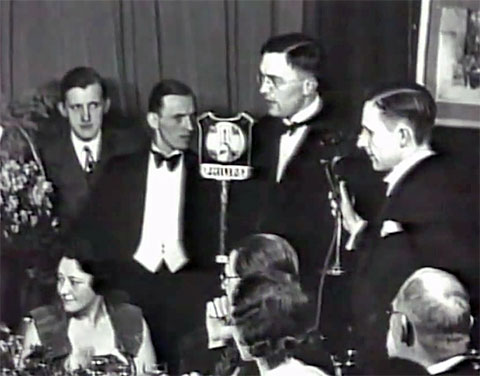
Max Euwe speaking (in Dutch) at the same gala
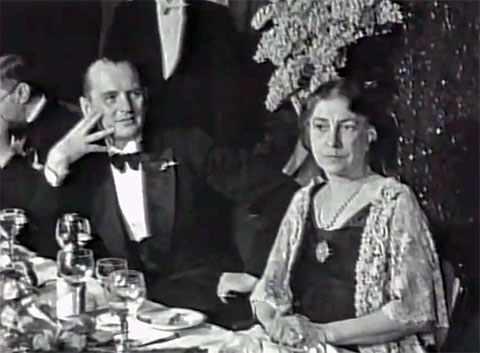
Alekhine at the table with his unique hand gestures
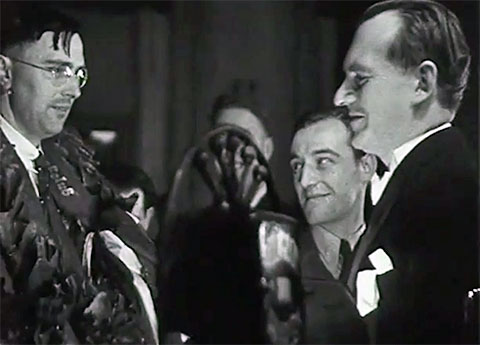
A courteous Alekhine congratulates Euwe, wearing the winner's wreath
A video with the footage of the opening ceremony, as well as the post-match speech,
and subsequent challenge by Alekhine
Video footage of the closing ceremony with Euwe wearing the winner's wreath
